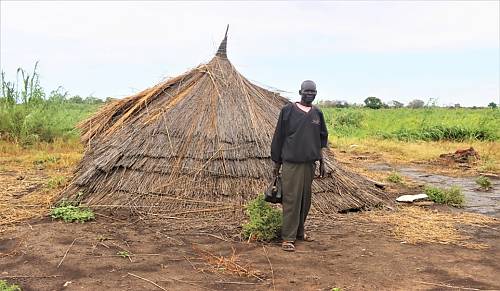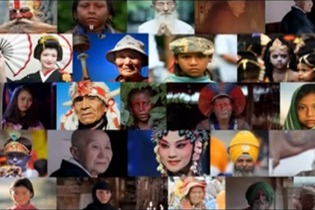30 April: online international conference on living heritage and climate change in Eastern Africa
 |
| A South Sudanese man in front of his house destroyed by flooding in Kangu/ Kujonok © UNESCO/ Mark Oloya Nekemiah |
On 30 April 2021, UNESCO is inviting stakeholders from Eastern Africa to an online conference to share case studies and review research results on the relationship between living heritage and biodiversity, climate change as well as disaster risk reduction.
The increasing frequency and intensity of natural disasters such as floods, fires, droughts, earthquakes and pest outbreaks is a constant reminder of how rapidly changing climate conditions are already affecting our lives. To face the challenges caused by climate change, communities continue to mobilize their living heritage, which has helped them adapt to their natural environment for centuries. Living heritage plays a proactive role in building the resilience of communities, conserving biodiversity and mitigating the effects of climate change.
In 2021, UNESCO launched a pilot initiative in Eastern Africa, one of the most disaster-prone regions in the world. Coordinated by the UNESCO Regional Office for Eastern Africa in Nairobi, the initiative supports research and documentation of intangible cultural heritage and traditional knowledge systems. It focuses on biodiversity conservation, climate change and disaster risk reduction in seven Eastern African countries (Eritrea, Ethiopia, Kenya, Seychelles, Somalia, South Sudan and Uganda). This initiative builds on the work carried out by UNESCO since 2016 on the safeguarding of intangible cultural heritage in emergency situations as well as the UNESCO Local and Indigenous Knowledge Systems (LINKS) programme. It was carried out in partnership with the United Nations Environment Programme (UNEP), the United Nations Office for Disaster Risk Reduction (UNDRR), and the International Centre for the Study of the Preservation and Restoration of Cultural Property (ICCROM).
As the final activity undertaken in the framework of this project, national research teams will gather on 30 April 2021 for an international conference. They will present case studies, ranging from the role of traditional knowledge systems in community recovery following floods and locust swarms in South Sudan to the mobilization of intangible cultural heritage for the conservation of aquatic life in Uganda. Involving representatives from national authorities, UNEP, UNDRR, ICCROM and community representatives, this online conference provides an opportunity to identify recommendations for next steps and future areas for collaboration. Results from this conference and the pilot initiative will be made available to researchers and the public through an online publication in 2021, which will be available on UNESCO and partners’ web sites.

Address: 81, Laiguangying West Road, Chaoyang District, Beijing, China
Zip Code: 100021
Tel: 86-10-64966526
Fax: 86-10-64969281
E-mail: crihap@crihap.cn
Leave us your e-mail address, we'll let you know about current events.



